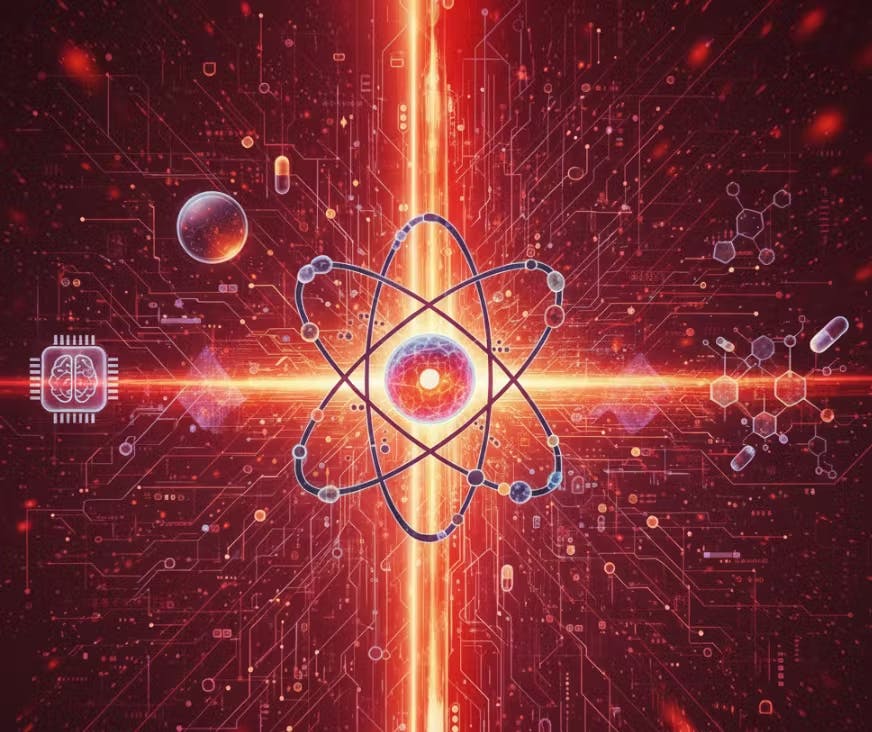Orchestrating a symphony of specialized AI agents to solve impossible problems. Here’s a look at the code.
The latest BCG report on new drug modalities is a mind-bender. We’re talking about cell therapies, gene editing, RNA therapeutics—treating biology like a programmable, information-based system. It’s the absolute cutting edge.
But it got me thinking. We’re trying to solve these exponentially complex problems with a painfully linear workflow. A biochemist, a geneticist, and a clinician collaborate over months via papers and meetings. It’s a system designed for a different era.
I’m convinced the only way to tackle this level of complexity is to change how we think, and the tools we use to think with. We need to move beyond using AI as a passive analysis tool and start using it as an active discovery engine.
We need to build a new kind of scientific team: a synthetic, cross-disciplinary “Manhattan Project” of AI agents. And the person who builds it is the AI Orchestrator.
Biology is a High-Dimensional Dataset
My core premise is simple: DNA, RNA, viruses, and the entire Rube Goldberg machine of human biochemistry are, at their foundation, the most complex datasets in the universe.
For a long time, we’ve used AI to find patterns in the results of our experiments. The agentic revolution lets us flip the script. We can now use teams of AIs to accelerate the messy, creative, and often serendipitous process of generating the hypothesis in the first place.
A “Synthetic Drug Discovery Team” with CrewAI
This isn’t science fiction. You can build a toy version of this right now. Let’s architect a simple “crew” with three specialized agents to tackle a drug discovery problem.
Our mission: “Propose a novel approach for a therapeutic to target Alzheimer’s Disease.”
First, get your environment set up.
pip install crewai crewai[tools] langchain_openai
# Make sure you have an OPENAI_API_KEY environment variable set
Now, let’s write the code to assemble our team.
import os
from crewai import Agent, Task, Crew, Process
from crewai_tools import SerperDevTool
# Initialize the internet search tool
search_tool = SerperDevTool()
# --- 1. Define Your Specialist Agents ---
# Agent 1: The Biochemist
biochemist = Agent(
role="Senior Biochemist specializing in neurodegenerative diseases",
goal="Analyze and summarize the latest biochemical research on Alzheimer"s, focusing on protein misfolding and amyloid plaques.',
backstory=(
"You are a world-renowned biochemist with deep expertise in the molecular mechanisms of "
"diseases like Alzheimer's. You are a master at reading dense scientific papers and "
"extracting the most critical, actionable insights."
),
verbose=True,
allow_delegation=False,
tools=[search_tool] # This agent can search the web
)
# Agent 2: The Gene Therapist
gene_therapist = Agent(
role="Expert Geneticist and Gene Therapy Researcher",
goal="Propose novel gene therapy or RNA-based therapeutic approaches based on biochemical findings.",
backstory=(
"You are at the cutting edge of genetic medicine. You think in terms of CRISPR, siRNA, and mRNA "
"delivery vectors. You take foundational biochemical research and envision how to turn it into "
"a programmable, information-based therapeutic."
),
verbose=True,
allow_delegation=False
# This agent does not need to search; it synthesizes the first agent's work
)
# Agent 3: "The Man off the Street" (The Pragmatist)
pragmatist = Agent(
role="A practical, common-sense patient advocate",
goal="Critique proposed therapeutic approaches from the perspective of a real patient. Focus on simplicity, cost, and real-world feasibility.",
backstory=(
"You are not a scientist. You represent the patient. You ask the naive, "
"common-sense questions that experts often forget. Is this treatment incredibly expensive? "
"Does it require weekly hospital visits? Is it more complicated than it needs to be? "
"Your job is to ground the brilliant science in human reality."
),
verbose=True,
allow_delegation=False
)
# --- 2. Create the Tasks for Your Agents ---
# Task for the Biochemist: Find the foundational research
research_task = Task(
description=(
"Conduct a comprehensive search on the biochemical basis of Alzheimer's Disease. "
"Specifically, find the latest research (last 2 years) on the role of Tau proteins and Amyloid-beta plaques. "
"Summarize the key molecular targets that are currently being investigated."
),
expected_output="A concise, bullet-point summary of 3-5 key molecular targets and a brief explanation of each.",
agent=biochemist
)
# Task for the Gene Therapist: Propose a novel solution
propose_therapy_task = Task(
description=(
"Based on the identified molecular targets, propose one novel RNA-based therapeutic approach. "
"Briefly describe the mechanism of action (e.g., using siRNA to silence a specific gene, "
"or an mRNA vaccine to trigger an immune response against plaques). Be creative and bold."
),
expected_output="A 2-paragraph proposal for a single, novel RNA-based therapy, including its target and proposed mechanism.",
agent=gene_therapist
)
# Task for the Pragmatist: Critique the proposal
critique_task = Task(
description=(
"Review the proposed RNA-based therapy. From a patient's perspective, identify the top 3 "
"potential real-world challenges or questions. For example, 'How is this delivered? A pill or an injection?', "
"'How often would I need this treatment?', 'Will this be affordable or only for the ultra-rich?'"
),
expected_output="A bullet-point list of the 3 most important, common-sense questions or concerns a patient would have about the proposed therapy.",
agent=pragmatist
)
# --- 3. Assemble the Crew and Kick Off the Mission ---
drug_discovery_crew = Crew(
agents=[biochemist, gene_therapist, pragmatist],
tasks=[research_task, propose_therapy_task, critique_task],
process=Process.sequential,
verbose=2
)
result = drug_discovery_crew.kickoff()
print("nn########################")
print("## Final Synthesized Report:")
print("########################n")
print(result)
When you run this code, you’re not just getting a single answer. You’re simulating a high-level, multi-disciplinary research meeting.
- The Biochemist does the foundational work, identifying the targets.
- The Gene Therapist takes those targets and uses them as inspiration to generate a novel, creative idea.
- The Pragmatist acts as the crucial “reality check,” forcing the brilliant science to confront the messy realities of patient life.
Now, imagine running thousands of these simulations in parallel. You could swap out the Gene Therapist for a “Molecular Chemist” agent. You could replace the Pragmatist with an “AI Ethicist” agent focused on risks. You could add a “Veterinarian” agent to see if there are cross-species insights from canine biology.
This is the job of the AI Orchestrator.
Their role is not to be the deepest expert in any single field. Their role is to be the architect of the discovery engine itself. They design the teams, run the tournament of ideas, and then analyze the output to find the surprising, testable hypotheses that emerge from the creative chaos.
We’re at the very beginning of this new paradigm. We’re moving from using AI to analyze the results of our experiments to using it to industrialize discovery. The human scientist isn’t being replaced; they’re being handed a new kind of thinking instrument, one that will allow us to solve the most important problems of our time.
#ai #drug-discovery #biotech #agentic-ai #crewai #python #future-of-work #r-and-d











